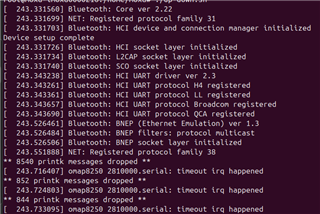Tool/software:
Hi TI Expert,
Based on this article (e2e.ti.com/.../4730883, we are aware that applying the patch "b67e830d38fa9335d927fe67e812e3ed81b4689c" may result in loss of UART data.
I have some questions:
1. Do we have a final solution to stop the interrupt storm?
2. If not, I would like to know what the worst case scenario is if the UART device goes into the interrupt storm. Will I get any corrupted data?
3. Will the amount of interruption be large enough to damage the OS?
4. How do I know if my OS is caught in an interrupt storm?
I have a wireless module that communicates with an AM62x SoC via a UART interface running at 3M baud rate. Sometimes, when I enable the wireless module for Bluetooth, the OS crashes.
In the first stage, I wanted to determine where the problem was, so I separated the wireless module. I connected UART TX to RX for loopback testing. In this test, the AM62x operates normally, and at 3M baud rate, the number of interrupts is about 9000 per second.

I'm just wondering if I don't apply the patch 'b67e830d38fa9335d927fe67e812e3ed81b4689c' and the OS is in an interrupt storm state, could it lead to the wireless module crashing? Or will it just receive some useless interrupts that won't harm anything but waste CPU time?
Thanks,
Sean







